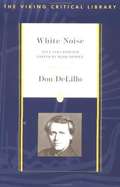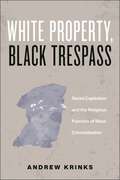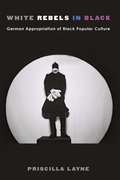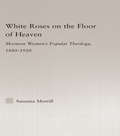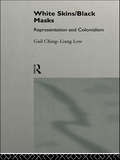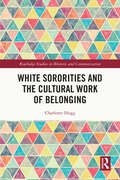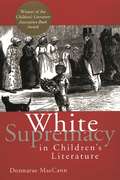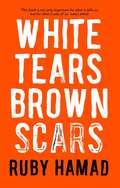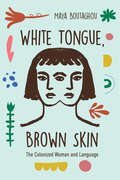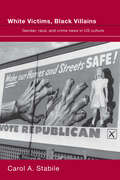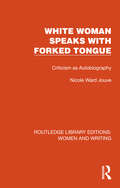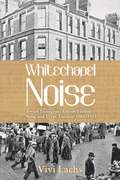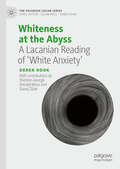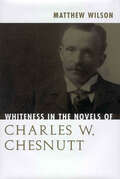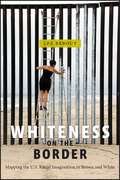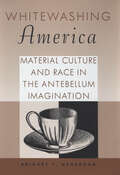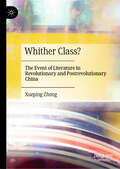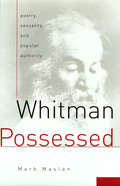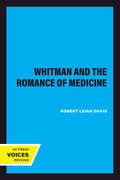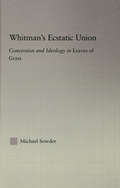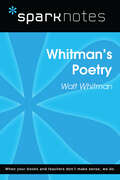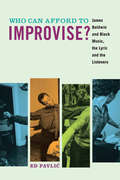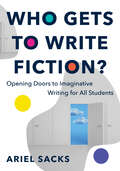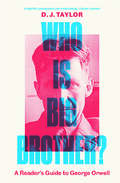- Table View
- List View
White Noise: Text and Criticism
by Don Delillo Mark OsteenWhite Noise is the story of Jack and Babette and their children from their six or so various marriages. They live in a college town where Jack is Professor of Hitler Studies (and conceals the fact that he does not speak a word of German), and Babette teaches posture and volunteers by reading from the tabloids to a group of elderly shut-ins. They are happy enough until a deadly toxic accident and Babette's addiction to an experimental drug make Jake question everything. White Noise is considered a postmodern classic and its unfolding of themes of consumerism, family and divorce, and technology as a deadly threat have attracted the attention of literary scholars since its publication. <P><P> This Viking Critical Library edition, prepared by scholar Mark Osteen, is the only edition of White Noise that contains the entire text along with an extensive critical apparatus, including a critical introduction, selected essays on the author, the work and its themes, reviews, a chronology of DeLillo's life and work, a list of discussion topics, and a selected bibliography.<P> Winner of the National Book Award
White Property, Black Trespass: Racial Capitalism and the Religious Function of Mass Criminalization (Religion and Social Transformation #16)
by Andrew KrinksUncovers the inherently religious structure of the criminalization of Black, Indigenous, and dispossessed peoplesMost popular critical accounts of mass criminalization interpret police and prisons as purely social or political phenomena. While such accounts have been indispensable in moving millions into collective action and resistance, the carceral state remains as pervasive as ever.White Property, Black Trespass argues that understanding why we have police and prisons, and building a world of safety and abundance beyond them, requires that we acknowledge the inherently religious function that criminalization fulfills for a colonial and racial capitalist order that puts its faith in cops and cages to save it from the existential threat of disorder that its own structural violence creates.The story of criminalization, Krinks shows, begins with the eurochristian aspiration to become God at the expense of all others—an aspiration that gives rise to the pseudo-sacred powers of whiteness and property, and, by extension, the police power that exists to serve and protect them. Tracing the historical continuity and religiosity of the color line, the property line, and the thin blue line, Krinks reveals police power as the pseudo-divine power to exile nonwhite and dispossessed trespassers to carceral hell. At once incisive and expansive, this groundbreaking work deepens understanding of racial capitalism and mass criminalization by illuminating the religious mythologies that animate them. It concludes with thoughts on what might be entailed in a religion rooted in rejection of the religious idolatry of mass criminalization—a religion of abolition.
White Rebels in Black: German Appropriation of Black Popular Culture (Social History, Popular Culture, And Politics In Germany)
by Priscilla D LayneAnalyzing literary texts and films, White Rebels in Black shows how German authors have since the 1950s appropriated black popular culture, particularly music, to distance themselves from the legacy of Nazi Germany, authoritarianism, and racism, and how such appropriation changes over time. Priscilla Layne offers a critique of how blackness came to symbolize a positive escape from the hegemonic masculinity of postwar Germany, and how black identities have been represented as separate from, and in opposition to, German identity, foreclosing the possibility of being both black and German. Citing four autobiographies published by black German authors Hans Jürgen Massaquo, Theodor Michael, Günter Kaufmann, and Charly Graf, Layne considers how black German men have related to hegemonic masculinity since Nazi Germany, and concludes with a discussion on the work of black German poet, Philipp Khabo Köpsell.
White Roses on the Floor of Heaven: Mormon Women's Popular Theology 1880-1920 (Religion in History, Society and Culture)
by Susanna MorrillFirst published in 2006. Routledge is an imprint of Taylor & Francis, an informa company.
White Skins/Black Masks: Representation and Colonialism
by Gail Ching-Liang Low Gail Ching-Liang LowIn this exciting re-reading of the classic work of Haggard and Kipling, Gail Ching-Liang Low examines the representational dynamics of colonizer versus colonized. Exploring the interface between the native 'other' as a reflection and as a point of address, the author asserts that this 'other' is a mirror reflecting the image of the colonizer - a 'cultural cross-dressing'. Employing psychoanalysis, anthropology and postcolonial theory, Low analyzes the way in which fantasy and fabulation are caught up in networks of desire and power. White Skins/Black Masks is a fascinating entry into the current debate of post-colonial theory.
White Sororities and the Cultural Work of Belonging (Routledge Studies in Rhetoric and Communication)
by Charlotte HoggCharlotte Hogg takes a close look, through the example of White university sororities, at how we create and cling to subcultures through the notion of belonging, and how spoken and unspoken rhetorics contribute to this notion. Renewed calls to end Greek-letter organizations for racism and sexism, including increased scrutiny on White women’s social justice failings, have intensified. But as Hogg shows, rhetorics of belonging have always occurred amid and even in response to anti-GLO sentiment. She shows how rhetorical efforts by members for members foster belonging for insiders while also seeking to appease those on the outside. In her analysis, Hogg positions the study of rhetoric beyond traditional methods of persuasion to show how we communicate and participate in communities as citizens in subtle ways beyond speaking and writing. Through engaging narrative drawing on her experiences as a member of a White sorority, archival research, and interviews with collegians and alumni, she shows how efforts toward belonging can influence particular beliefs about womanhood in complex ways. This thought-provoking volume will interest scholars and students from a range of disciplines, including rhetoric and communication studies, gender studies, feminism, sociology, cultural anthropology, and history.
White Supremacy in Children's Literature: Characterizations of African Americans, 1830-1900 (Children's Literature and Culture)
by Donnarae MacCannThis penetrating study of the white supremacy myth in books for the young adds an important dimension to American intellectual history. The study pinpoints an intersecting adult and child culture: it demonstrates that many children's stories had political, literary, and social contexts that paralleled the way adult books, schools, churches, and government institutions similarly maligned black identity, culture, and intelligence. The book reveals how links between the socialization of children and conservative trends in the 19th century foretold 20th century disregard for social justice in American social policy. The author demonstrates that cultural pluralism, an ongoing corrective to white supremacist fabrications, is informed by the insights and historical assessments offered in this study.
White Tears/Brown Scars
by Ruby HamadWhen white people cry foul it is often people of colour who suffer. White tears have a potency that silences racial minorities. White Tears/Brown Scars blows open the inconvenient truth that when it comes to race, white entitlement is too often masked by victimhood. Never is this more obvious than the dealings between women of colour and white women. What happens when racism and sexism collide? Ruby Hamad provides some confronting answers.
White Tongue, Brown Skin: The Colonized Woman and Language
by Maya BoutaghouExamines the effect of prescribed multilingualism as expressed by women writers in colonial contexts What does it mean to be an heir, as a woman writer, to colonial and postcolonial cultures in which European language has become so thoroughly ingrained? Examining women writers from India (Toru Dutt), Egypt (Mayy Ziyadah), Algeria (Assia Djebar), and Mauritius (Ananda Devi), White Tongue, Brown Skin sheds light on the essential double nature of the colonial experience. Maya Boutaghou&’s latest book—her first in English—treats colonialism as analogous to a disease, manifesting itself in symptoms of multilingualism and cultural pluralism. Boutaghou shows how violently imposed multilingualism engenders in the mind of the colonized subject a state of permanent self-translation between two or more languages with unequal political and emotional power. They must endure a plural perception of the self, defined by the restless movement of self-translation, which becomes reflected in a literary dynamic frequently overlooked or misunderstood by previous scholarship. Although the object is philosophical, this book is also deeply rooted in history. Understanding postcolonialism from below, as Boutaghou demonstrates, starts with an approach based on close readings in specific historical contexts.
White Victims, Black Villains: Gender, Race, and Crime News in US Culture
by Carol A. StabileAre all victims white? Are all villains black?White Victims, Black Villains traces how race and gender have combined in news media narratives about crime and violence in US culture. The book argues that the criminalization of African Americans in US culture has been most consistently and effectively legitimized by news media deeply invested in protecting and maintaining white supremacy. An illuminating, and often shocking text, White Victims, Black Villains should be read by anyone interested in race and politics.
White Whispers: Selected Poems of Salabega
by Niranjan MohantyThe Book Is An Attempt To Bring To Limelight The Hidden, Unexplored Richness And Sophistication Of A 17Th Century Oriya Devotional Poet Whose Intense Piety Coupled With The Metaphoric Interiority Of The Medium Creates A Unique Kind Of Poetic Art.
White Woman Speaks with Forked Tongue: Criticism as Autobiography (Routledge Library Editions: Women and Writing)
by Nicole Ward JouveOriginally published in 1991. The style of this startlingly original appraisal of a broad range of women’s writing suggests a new direction for feminist criticism, combining as it does challenging, intellectual debate and fresh textual analysis with fictional example and autobiographical detail to make a wholly new invention in the field. In addressing the need for the critic to say ‘I’ and to own judgments and statements instead of attributing these to an apparently impersonal third person, the author here points up some of the shortcomings of much prevailing ‘feminist’ analysis, challenging the very foundations of the Anglo-American feminist idea. Purposely avoiding the ‘totalising’ effect of much academic criticism, the writer/critic finds a new format and a new methodology for her insights and observations on a range of writers, from Doris Lessing to Hélène Cixious. Her unique analysis of the links between criticism and autobiography enable her to highlight the absurdity of attempting to write in the light of recent critical and scientific knowledge as if the self were a stable, unified construct, introducing instead a new, creative understanding of the methods and modes of women’s writing. This sparkling collection presents an exciting and original new voice in literary criticism. It tackles issues fundamental to literary theory, feminist criticism, psychoanalysis and cultural studies, offering new critical insights and providing a significant and wholly original feminist contribution to these key fields.
Whitechapel Noise: Jewish Immigrant Life in Yiddish Song and Verse, London 1884–1914
by Vivi LachsArchive material from the London Yiddish press, songbooks, and satirical writing offers a window into an untold cultural life of the Yiddish East End. Whitechapel Noise: Jewish Immigrant Life in Yiddish Song and Verse, London 1884–1914 by Vivi Lachs positions London’s Yiddish popular culture in historical perspective within Anglo-Jewish history, English socialist aesthetics, and music-hall culture, and shows its relationship to the transnational Yiddish-speaking world. Layers of cultural references in the Yiddish texts are closely analyzed and quoted to draw out the complex yet intimate histories they contain, offering new perspectives on Anglo-Jewish historiography in three main areas: politics, sex, and religion. The acculturation of Jewish immigrants to English life is an important part of the development of their social culture, as well as to the history of London. In part one of the book, Lachs presents an overview of daily immigrant life in London, its relationship to the Anglo-Jewish establishment, and the development of a popular Yiddish theatre and press, establishing a context from which these popular came. The author then analyzes the poems and songs, revealing the hidden social histories of the people writing and performing them. For example, how Morris Winchevsky’s London poetry shows various attempts to engage the Jewish immigrant worker in specific London activism and political debate. Lachs explores themes of marriage, relationships, and sexual exploitation appear regularly in music-hall songs, alluding to the changing nature of sexual roles in the immigrant London community influenced by the cultural mores of their new location. On the theme of religion, Lachs examines how ideas from Jewish texts and practice were used and manipulated by the socialist poets to advance ideas about class, equality, and revolution, and satirical writings offer glimpses into how the practice of religion and growing secularization was changing immigrants’ daily lives in the encounter with modernity. The detailed and nuanced analysis found in Whitechapel Noise offers a new reading of Anglo-Jewish, London, and immigrant history. It is a must-read for Jewish and Anglo-Jewish historians and those interested in Yiddish, London, and migration studies.
Whiteness at the Abyss: A Lacanian Reading of ‘White Anxiety’ (The Palgrave Lacan Series)
by Derek Hook&‘Whiteness&’ is an omnipresent term within research on race and racism. This book differs from existing conceptualizations by adopting a psychoanalytic line of approach and by directing its attention to a particular socio-historical instantiation of whiteness—the investments, fantasies and fears apparent within (post) apartheid South African contexts. It foregrounds the notion of &‘white anxiety&’, which is conceptualized not only via notions of psychical temporality, but with reference to the dystopian visions of the future, ideas of inter-generational guilt, and fantasies of demise. To posit an imagined &‘end to whiteness&’ is not, of course, an uncontroversial gesture; the closing section of the book surveys the key themes—antisemitism, white Nationalism, the trope of the race traitor—in online attacks the author was subjected to. This compelling work will appeal to all those with an interest in psychoanalytic approaches to race and racism, and to anyone working in the areas of critical race and whiteness studies.
Whiteness in the Novels of Charles W. Chesnutt
by Matthew WilsonCharles W. Chesnutt (1858–1932), critically acclaimed for his novels, short stories, and essays, was one of the most ambitious and influential African American writers of the late nineteenth and early twentieth centuries. Today recognized as a major innovator of American fiction, Chesnutt is an important contributor to deromanticizing trends in post–Civil War southern literature, and a singular voice among turn-of-the-century realists who wrote about race in American life. Whiteness in the Novels of Charles W. Chesnutt is the first study to focus exclusively on Chesnutt's novels. Examining the three published in Chesnutt's lifetime—The House Behind the Cedars, The Marrow of Tradition, and The Colonel's Dream—as well as his posthumously published novels, this study explores the dilemma of a black writer who wrote primarily for a white audience. Throughout, Matthew Wilson analyzes the ways in which Chesnutt crafted narratives for his white readership and focuses on how he attempted to infiltrate and manipulate the feelings and convictions of that audience. Wilson pays close attention to the genres in which Chesnutt was working and also to the social and historical context of the novels. In articulating the development of Chesnutt's career, Wilson shows how Chesnutt's views on race evolved. By the end of his career, he felt that racial differences were not genetically inherent, but social constructions based on our background and upbringing. Finally, the book closely examines Chesnutt's unpublished manuscripts that did not deal with race. Even in these works, in which African Americans are only minor characters, Wilson finds Chesnutt engaged with the conundrum of race and reveals him as one of America's most significant writers on the subject.
Whiteness on the Border: Mapping the US Racial Imagination in Brown and White (Nation of Nations #19)
by Lee BeboutThe many lenses of racism through which the white imagination sees Mexicans and Chicanos Historically, ideas of whiteness and Americanness have been built on the backs of racialized communities. The legacy of anti-Mexican stereotypes stretches back to the early nineteenth century when Anglo-American settlers first came into regular contact with Mexico and Mexicans. The images of the Mexican Other as lawless, exotic, or non-industrious continue to circulate today within US popular and political culture. Through keen analysis of music, film, literature, and US politics, Whiteness on the Border demonstrates how contemporary representations of Mexicans and Chicano/as are pushed further to foster the idea of whiteness as Americanness. Illustrating how the ideologies, stories, and images of racial hierarchy align with and support those of fervent US nationalism, Lee Bebout maps the relationship between whiteness and American exceptionalism. He examines how renderings of the Mexican Other have expressed white fear, and formed a besieged solidarity in anti-immigrant rhetoric and policies. Moreover, Whiteness on the Border elucidates how seemingly positive representations of Mexico and Chicano/as are actually used to reinforce investments in white American goodness and obscure systems of racial inequality. Whiteness on the Border pushes readers to consider how the racial logic of the past continues to thrive in the present.
Whitewashing America: Material Culture and Race in the Antebellum Imagination
by Bridget T. HeneghanEven before mass marketing, American consumers bought products that gentrified their households and broadcast their sense of "the good things in life." Bridging literary scholarship, archaeology, history, and art history, Whitewashing America: Material Culture and Race in the Antebellum Imagination explores how material goods shaped antebellum notions of race, class, gender, and purity. From the Revolutionary War until the Civil War, American consumers increasingly sought white-colored goods. Whites preferred mass-produced and specialized products, avoiding the former dark, coarse, low-quality products issued to slaves. White consumers knit around themselves refined domestic items, visual reminders of who they were, equating wealth, discipline, and purity with the racially "white." Clothing, paint, dinnerware, gravestones, and buildings staked a visual contrast, a portable, visible title and deed segregating upper-class whites from their lower-class neighbors and household servants. This book explores what it meant to be "white" by delving into the whiteness of dishes, gravestone art, and architecture, as well as women's clothing and corsets, cleanliness and dental care, and complexion. Early nineteenth-century authors participated in this material economy as well, building their literary landscapes in the same way their readers furnished their households and manipulating the understood meanings of things into political statements. Such writers as James Fenimore Cooper and John Pendleton Kennedy use setting descriptions to insist on segregation and hierarchy. Such authors as Harriet Beecher Stowe, Nathaniel Hawthorne, Edgar Allan Poe, and Herman Melville, struggled to negotiate messages of domesticity, body politics, and privilege according to complex agendas of their own. Challenging the popular notions, slave narrators such as Frederick Douglass and Harriet Jacobs wielded white objects to reverse the perspective of their white readers and, at times, to mock their white middle-class pretensions.
Whither Class?: The Event of Literature in Revolutionary and Postrevolutionary China
by Xueping ZhongThis book argues that the revolutionary, anti-revolutionary, counter-revolutionary, and post-revolutionary dialectics in modern Chinese history since the early-20th century characterizes modern and contemporary Chinese literature the most. Central to these dialectics are issues of class. The book contends that one cannot fully understand modern and contemporary Chinese literature without understanding the class character of Chinese revolutionary and counter-revolutionary struggles, including literary practices and their various contradictions. Considering literature via the notion of “the event” and focusing on three specific historical junctures, this project explores how, as a major cultural form, literature has played an outsize role in China’s struggle for liberation and quest for modernity. It highlights the need to understand class and the extent to which it shapes literary and artistic forms and expressions as well as the on-going debates over the relationship between politics and aesthetics.
Whitman Possessed: Poetry, Sexuality, and Popular Authority
by Mark MaslanWhitman has long been more than a celebrated American author. He has become a kind of hero, whose poetry vindicates beliefs not only about poetry but also about sexuality and power. In Whitman Possessed: Poetry, Sexuality, and Popular Authority, Mark Maslan presents a challenging theory of Whitman's poetics of possession and his understandings of individual and national identity. By reading his works in relation to nineteenth-century theories of sexual desire, poetic inspiration, and political representation, Maslan argues that the disintegration of individuality in Whitman's texts is not meant to undermine cultural hierarchies, but to make poetic and political authority newly viable.In particular, Maslan explores the social impact of nineteenth-century sexual hygiene literature on Whitman's works. He argues that Whitman developed his ideas about poetry, sexuality, and authority by responding to a prominent argument that desire subjected male bodies to a penetrating and feminizing force. By identifying poetic inspiration with this erotic dynamic, Whitman imbued his poetic voice with a kind of transformative power. Whitman aligned his poetry with an impartial authority hard to find elsewhere and inclined his work as a poet to speak for the voiceless, for the masses, and for an entire nation.
Whitman and the Romance of Medicine
by Robert Leigh DavisIn this compelling, accessible examination of one of America's greatest cultural and literary figures, Robert Leigh Davis details the literary and social significance of Walt Whitman's career as a nurse during the American Civil War. Davis shows how the concept of "convalescence" in nineteenth-century medicine and philosophy—along with Whitman's personal war experiences—provide a crucial point of convergence for Whitman's work as a gay and democratic writer.In his analysis of Whitman's writings during this period—Drum-Taps, Democratic Vistas, Memoranda During the War, along with journalistic works and correspondence—Davis argues against the standard interpretation that Whitman's earliest work was his best. He finds instead that Whitman's hospital writings are his most persuasive account of the democratic experience. Deeply moved by the courage and dignity of common soldiers, Whitman came to identify the Civil War hospitals with the very essence of American democratic life, and his writing during this period includes some of his most urgent reflections on suffering, sympathy, violence, and love. Davis concludes this study with an essay on the contemporary medical writer Richard Selzer, who develops the implications of Whitman's ideas into a new theory of medical narrative.
Whitman's Ecstatic Union: Conversion and Ideology in Leaves of Grass (Studies in Major Literary Authors #38)
by Michael SowderFirst Published in 2005. Routledge is an imprint of Taylor & Francis, an informa company.
Whitman's Poetry (SparkNotes Literature Guide Series)
by SparkNotesWhitman's Poetry (SparkNotes Literature Guide) by Walt Whitman Making the reading experience fun! Created by Harvard students for students everywhere, SparkNotes is a new breed of study guide: smarter, better, faster. Geared to what today's students need to know, SparkNotes provides: *Chapter-by-chapter analysis *Explanations of key themes, motifs, and symbols *A review quiz and essay topicsLively and accessible, these guides are perfect for late-night studying and writing papers
Who Can Afford to Improvise?: James Baldwin and Black Music, the Lyric and the Listeners
by Ed PavlićMore than a quarter-century after his death, James Baldwin remains an unparalleled figure in American literature and African American cultural politics. In Who Can Afford to Improvise? Ed Pavlić offers an unconventional, lyrical, and accessible meditation on the life, writings, and legacy of James Baldwin and their relationship to the lyric tradition in black music, from gospel and blues to jazz and R&B. Based on unprecedented access to private correspondence, unpublished manuscripts and attuned to a musically inclined poet’s skill in close listening, Who Can Afford to Improvise? frames a new narrative of James Baldwin’s work and life. The route retraces the full arc of Baldwin’s passage across the pages and stages of his career according to his constant interactions with black musical styles, recordings, and musicians.Presented in three books — or movements — the first listens to Baldwin, in the initial months of his most intense visibility in May 1963 and the publication of The Fire Next Time. It introduces the key terms of his lyrical aesthetic and identifies the shifting contours of Baldwin’s career from his early work as a reviewer for left-leaning journals in the 1940s to his last published and unpublished works from the mid-1980s. Book II listens with Baldwin and ruminates on the recorded performances of Billie Holiday and Dinah Washington, singers whose message and methods were closely related to his developing world view. It concludes with the first detailed account of “The Hallelujah Chorus,” a performance from July 1, 1973, in which Baldwin shared the stage at Carnegie Hall with Ray Charles. Finally, in Book III, Pavlić reverses our musically inflected reconsideration of Baldwin’s voice, projecting it into the contemporary moment and reading its impact on everything from the music of Amy Winehouse, to the street performances of Turf Feinz, and the fire of racial oppression and militarization against black Americans in the 21st century.Always with an ear close to the music, and avoiding the safe box of celebration, Who Can Afford to Improvise? enables a new kind of “lyrical travel” with the instructive clarity and the open-ended mystery Baldwin’s work invokes into the world.
Who Gets to Write Fiction?: Opening Doors to Imaginative Writing for All Students
by Ariel SacksWriting and sharing fiction allows adolescents to glimpse other lives The current curricular emphasis on analytical writing can make it feel risky to teach creative writing in ELA classrooms. But the opportunity to write fiction in school opens many doors for young people: doors the author argues are critical to the development of our students, our education system, and even our democracy. This book will delight English teachers weary of focusing relentlessly on argument and information writing. Veteran teacher Ariel Sacks vividly describes the many academic, social–emotional, and community-building advantages of teaching imaginative writing in the classroom, not least of which is the impact it has on equity for marginalized students. Her book is a teacher-to-teacher text that folds in detailed, practical guidance about how to design lessons and meet standards, while presenting a powerful central argument: that the writing of fiction should be treated not as a luxury for some, but as a center of the English curriculum for all students.
Who Is Big Brother?: A Reader's Guide to George Orwell
by D. J. TaylorA spirited and essential companion to Orwell and his works, covering all the novels and major essays An intellectual who hated intellectuals, a socialist who didn&’t trust the state—our foremost political essayist and author of Animal Farm and Nineteen Eighty-Four was a man of stark, puzzling contradictions. Knowing Orwell&’s life and reading Orwell&’s works produces just as many questions as it answers. Celebrated Orwell biographer D. J. Taylor guides fans and new readers alike through the many twists and turns of Orwell&’s books, life and thought. As a writer he intended his works to be transparent and instantly accessible, yet they are also full of secrets and surprises, tantalising private histories, and psychological quirks. From his conflicted relationship with religion to his competing anti-imperialism and fascination with empire, Who Is Big Brother? delves into the complex development of this essential yet enigmatic voice. Taylor leads us through Orwell&’s principal writings and complex life—crafting an illuminating guide to one of the most enduringly relevant writers in the English language.
